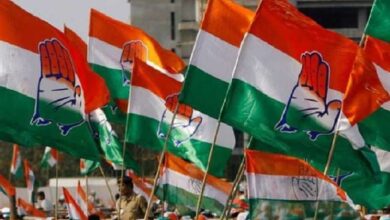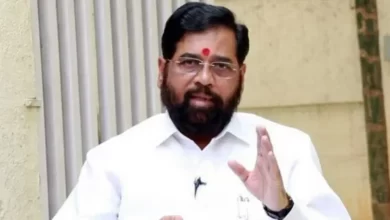question of election expenditure

[ad_1]
The democracy of India is facing many difficulties due to the influence of money power.
Shivendra Rana
The democracy of India is facing many difficulties due to the influence of money power. Its worst and indirect effect is the increase in corruption or to say that corruption gets undeclared recognition. Those who win elections by spending crores do not come from the sense of public service. Their primary motive is to collect the money they have spent and recover the cost of the next election.
Electoral expenditure is an issue in which the Election Commission, the political party and the Government of India all have their own views. In principle, it has been recognized that every citizen of the country has the right to participate in the elections or to be elected. Therefore, in order to provide an equal opportunity to all, the expenditure limit of the candidates was fixed under the election code, so that it should not happen that the rich class wins the election on the basis of economic power and the relatively poor or the common people are left behind in it.
The Union Ministry of Law and Justice has decided to increase the election expenditure limit by ten percent by amending the provision-90 of the Election Rules, 1961. Corona epidemic has been cited as the reason behind this. According to this, now the maximum limit of expenditure for Lok Sabha elections can be increased from seventy lakhs to seventy seven lakhs and for assembly elections from twenty eight lakhs to thirty one lakh seventy five thousand rupees. Earlier in February 2014, the election expenditure limit was increased. The Election Commission has formed a committee to implement the decision to increase the election expenditure limit.
The Election Commission has taken several measures to ensure compliance with the election expenditure ceiling, such as fixing the acceptable cost of expenditure, appointing observers to monitor the expenditure, checking the expenditure register of the candidate and assessing the observers. Comparisons, even getting the major election programs of candidates videographed etc. But the reality is that despite all these measures, there has been no significant success in checking the increased use of money in elections or in ascertaining the reality of expenditure.
As efforts were made to regulate the expenditure of money, new ways were also invented to make these rules ineffective. For this, mutual cohesion of political parties, convenient opposition of parties on this issue, lack of political will as well as administrative laxity are also to blame. Political parties argue that the hitherto fixed limit on election expenditure is impractical. In the case of spending more than the prescribed limit on the candidates, they argue that if the election expenditure limit is increased, then the candidates will not have to lie in their affidavits.
Despite this the reality is somewhat different. After independence, the pressure of money on the democracy of India is increasing. If we want to see the effect of money on democracy, then some figures have to be looked at. In the first three Lok Sabha elections of the country, the government expenditure was about ten crore rupees per year. In the 2009 Lok Sabha elections, it was one thousand four hundred and eighty three crores, which increased in the year 2014 to more than two and a half times i.e. three thousand eight hundred and seventy crores. The percentage of MPs with assets of more than one crore has increased to eighty-eight percent in 2009, eighty-two percent in 2014 and eighty-eight percent in 2019.
According to another data, there has been an average increase of twenty nine percent in the assets of re-elected (2019) MPs. In the year 2009, the expenditure limit in the Lok Sabha elections was raised to twenty five lakh rupees, in 2011 to forty lakh rupees and in 2014 to seventy lakh rupees. It appears from these figures that if a person from a normal or low economic background wants to make politics a medium for public service, then the chances of getting elected are rare.
In fact, no serious effort was ever made to regulate the funds of political parties and their financial sources. Even if they have been, they have either not been fully defined or they have left such flaws that they can be used easily by the politicians. For example, in order to avoid the law of giving details of donations above twenty thousand rupees, political parties kept reporting their donations up to ninety percent within this prescribed limit.
In the year 2003, a provision was made by the Parliament that if a senior leader visits that constituency in favor of a candidate, then it will not be added to the election expenses of that candidate. Apart from this, the expenditure incurred by the candidate by his friends, relatives, any private organization or corporation by donating to political parties or by any other means should be added to the election expenses of the candidate. The Supreme Court, under a decision, had ordered to include the expenditure incurred by political parties in the election expenditure. But here also the government reversed this decision by exercising its constitutional power.
In the year 2018, the Central Government had issued the notification of the Electoral Bond Scheme. It has been presented as an alternative to cash donations to political parties. In the 2018 budget, political parties were allowed to receive donations/contribution from foreign sources. Accordingly, the Foreign Contribution (Regulation) Act, 2010 was amended. The definition of a foreign company has been modified under this amendment. Through this, the maximum limit on political donations to companies was removed. Earlier, companies could only give a maximum of seven and a half percent of their three-year net profit as political donations. At the same time, he was also exempted from the condition of stating to which party how much he had donated.
The democracy of India is facing many difficulties due to the influence of money power. Its worst and indirect effect is the increase in corruption or to say that corruption gets undeclared recognition. Those who win elections by spending crores do not come from the sense of public service. Their primary motive is to collect the money they have spent and recover the cost of the next election. The second disadvantage is that criminals also get incentives from it. Through politics, anti-social elements and criminals become ‘honorable’ due to which they get priority over law and administration and they use this to increase their dominance. Twenty-nine percent of the candidates accused of criminal cases won the 2009 elections. This figure was thirty-four percent in 2014 and increased to forty-three percent in 2019.
In the last two-three decades, the number of candidates with criminal background and good economic background getting elected in the Indian electoral scenario has increased rapidly. There appears to be some sort of connection between these two facts and this is a matter of serious concern. The biggest blame for this is the political parties, because unless they give preference to the individual’s ability to be a candidate rather than the influence of economic ability and muscle power, these conditions will remain the same.
In Kanwarlal Gupta v Amarnath Chawla (1974), the Supreme Court had hoped that any individual or political party, however small, should be at liberty to practice equality with any other person or political party. Can contest elections on the basis of how rich he may be. No individual or political party should get more advantage over others because of its better financial position. However, at present this expectation does not seem to be fulfilled.
,
[ad_2]






